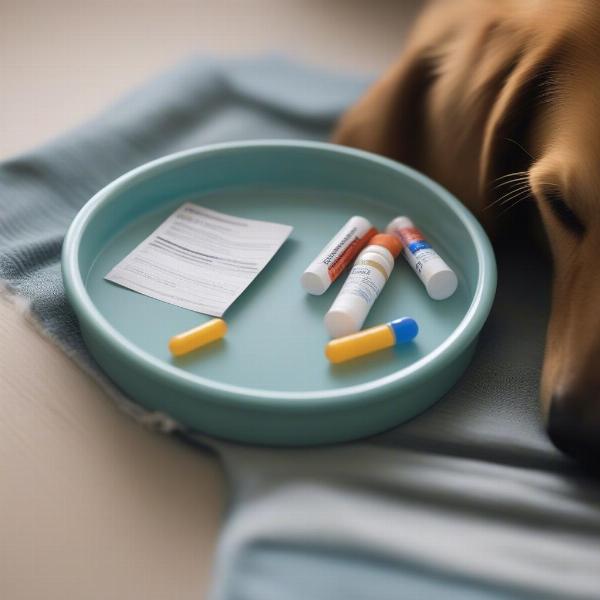Forbid for dogs, also known as sulfadimethoxine, is a sulfonamide antibiotic commonly used to treat various bacterial infections in dogs. Understanding its uses, dosage, and potential side effects is crucial for responsible pet ownership. This guide provides a comprehensive overview of Forbid for dogs, equipping owners with the necessary information to ensure their furry companions receive safe and effective treatment.
Understanding Forbid (Sulfadimethoxine)
Forbid is prescribed for a range of bacterial infections, including urinary tract infections, respiratory infections, skin infections, and certain protozoal infections like coccidiosis. It works by inhibiting bacterial growth and reproduction. Vets often choose Forbid for its effectiveness against specific types of bacteria and its relatively long half-life, meaning less frequent dosing.
 Forbid medication for dogs
Forbid medication for dogs
Dosage and Administration of Forbid for Dogs
The dosage of Forbid is determined by your veterinarian based on your dog’s weight, the severity of the infection, and individual factors. It’s crucial to follow your vet’s instructions precisely and complete the full course of treatment, even if your dog’s symptoms improve. Failing to do so could lead to antibiotic resistance and recurrence of the infection. Forbid is typically administered orally as a tablet or liquid. Some dogs may resist taking the medication due to its taste. Consult with your vet about ways to administer the medication if your dog is hesitant.
Potential Side Effects of Forbid for Dogs
While generally safe, Forbid can cause side effects in some dogs. forbid for dogs side effects may include vomiting, diarrhea, loss of appetite, lethargy, and allergic reactions such as skin rashes or facial swelling. In rare cases, more serious side effects like liver or kidney damage, or blood disorders can occur. If you notice any unusual symptoms in your dog after administering Forbid, contact your veterinarian immediately.
Precautions and Considerations
Before administering Forbid, inform your veterinarian about any other medications your dog is currently taking, as well as any pre-existing health conditions. Certain medications can interact with Forbid, potentially causing adverse effects. Forbid is not recommended for pregnant or lactating dogs. Also, dogs with known sulfa drug allergies should not be given Forbid. forbid for dog requires careful monitoring and adherence to veterinary guidance.
When to See Your Veterinarian
If your dog exhibits signs of a bacterial infection, such as fever, lethargy, changes in appetite or urination, or skin abnormalities, consult your veterinarian promptly. They can diagnose the infection and determine if Forbid or another antibiotic is the appropriate treatment. Never self-medicate your dog, as this can be dangerous and ineffective.
Conclusion
Forbid can be an effective treatment for various bacterial infections in dogs. However, responsible usage, including proper dosage, administration, and monitoring for side effects, is crucial for ensuring your dog’s safety and well-being. Always consult with your veterinarian for diagnosis and treatment recommendations. forbid for dogs should only be administered under veterinary supervision.
FAQ
- How should I store Forbid? Store Forbid in a cool, dry place away from direct sunlight and out of reach of children and pets.
- What if I miss a dose? Administer the missed dose as soon as you remember. However, if it’s close to the next scheduled dose, skip the missed dose and continue with the regular schedule. Do not double dose.
- Can Forbid be used in cats? While Forbid is primarily used in dogs, it can be used in cats under strict veterinary supervision.
- What are the signs of an allergic reaction to Forbid? Signs of an allergic reaction can include facial swelling, hives, difficulty breathing, and vomiting.
- How long does it take for Forbid to start working? You may start to see improvement in your dog’s condition within a few days, but it’s crucial to complete the entire course of treatment as prescribed by your veterinarian.
- Can Forbid be given with food? Yes, Forbid can be given with food to help minimize potential gastrointestinal upset.
- Are there any natural alternatives to Forbid? While some natural remedies may help support your dog’s immune system, it’s essential to consult with your veterinarian before using any alternative treatments for bacterial infections.
Related Articles:
About ILM Dog:
ILM Dog is your trusted international resource for expert dog care advice. We offer guidance on everything from breed selection and health to training, nutrition, and grooming. Our goal is to empower dog owners worldwide with the knowledge and resources they need to provide the best possible care for their canine companions. Whether you’re a seasoned dog owner or just starting your journey, ILM Dog is here to support you. For inquiries or expert advice, contact us at [email protected] or call us at +44 20-3965-8624.